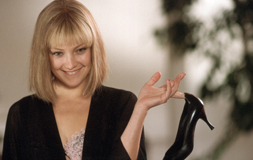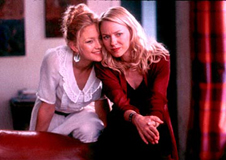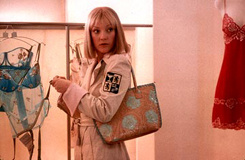Le Divorce (James Ivory, 2003)
 James Ivoryís Le
Divorce isnít very ambitious but itís pleasant in both its poise and
reserve. This is something of a contrast to many of Ivoryís best films, which
manage to turn their wealth of poise and reserve into a profound statement, but
it really only feels deficient when compared to the heights that past Merchant /
Ivory films have reached. A veritable love letter to Paris (thereís a even
montage paying tribute to the cityís scarves early on!), the movie certainly
exhibits more bounce than the average film by the producer/director duo. It
presents a portrait of the city thatís so infused with romance that itís
impossible for its young American heroines (played by Kate Hudson and Naomi
Watts) to feel terribly displaced for too long. It embraces the cityís food,
culture and language enthusiastically. Because of its attentiveness to costume,
settings and props, the movie achieves the feel of a period piece at times,
despite its modern day setting. Much of the humor in this comedy of manners
comes from the differences in French and American mores, but it to its credit
that, it doesnít require Hudsonís character to be hopelessly naÔve about
sex to be shocked by the French sexual openness.
James Ivoryís Le
Divorce isnít very ambitious but itís pleasant in both its poise and
reserve. This is something of a contrast to many of Ivoryís best films, which
manage to turn their wealth of poise and reserve into a profound statement, but
it really only feels deficient when compared to the heights that past Merchant /
Ivory films have reached. A veritable love letter to Paris (thereís a even
montage paying tribute to the cityís scarves early on!), the movie certainly
exhibits more bounce than the average film by the producer/director duo. It
presents a portrait of the city thatís so infused with romance that itís
impossible for its young American heroines (played by Kate Hudson and Naomi
Watts) to feel terribly displaced for too long. It embraces the cityís food,
culture and language enthusiastically. Because of its attentiveness to costume,
settings and props, the movie achieves the feel of a period piece at times,
despite its modern day setting. Much of the humor in this comedy of manners
comes from the differences in French and American mores, but it to its credit
that, it doesnít require Hudsonís character to be hopelessly naÔve about
sex to be shocked by the French sexual openness.
 As we watch the sisters in Le Divorce ride through their individual romantic roller coasters,
the two plots complement each other well. Hudsonís might superficially feel a
bit frivolous, but the seriousness of her sisterís life diffuses some
melancholy throughout her scenes. By crosscutting between the two narrative
threads, the film seems to be both commenting on the inevitable fall that awaits
the younger, more idealistic sister and suggesting at new possibilities for the
older. The more overt attempts to push the film into more dramatic territory are
generally the least successful in the film, though, and there happen to be a lot
of them. Thereís a weak suicide attempt, an almost random murder, a somewhat
uncertain hostage situation and a few half-hearted crises of conscience. Each
near-tragedy that is presented and scenes such as the diabolical talk that two
mothers share late in the film, only cement the novelistic feel here. Ivoryís
disposition toward long takes and tracking shots tends to underscore it as well.
Itís mildly disappointing then that the ending scenes find the various strands
of the movie coming together more successfully in a narrative sense than in an
emotional one. Considering the wealth of character and the variety of
predicaments that are presented, a tidy ending would be difficult, but what
weíre given is too close to inept for comfort.
As we watch the sisters in Le Divorce ride through their individual romantic roller coasters,
the two plots complement each other well. Hudsonís might superficially feel a
bit frivolous, but the seriousness of her sisterís life diffuses some
melancholy throughout her scenes. By crosscutting between the two narrative
threads, the film seems to be both commenting on the inevitable fall that awaits
the younger, more idealistic sister and suggesting at new possibilities for the
older. The more overt attempts to push the film into more dramatic territory are
generally the least successful in the film, though, and there happen to be a lot
of them. Thereís a weak suicide attempt, an almost random murder, a somewhat
uncertain hostage situation and a few half-hearted crises of conscience. Each
near-tragedy that is presented and scenes such as the diabolical talk that two
mothers share late in the film, only cement the novelistic feel here. Ivoryís
disposition toward long takes and tracking shots tends to underscore it as well.
Itís mildly disappointing then that the ending scenes find the various strands
of the movie coming together more successfully in a narrative sense than in an
emotional one. Considering the wealth of character and the variety of
predicaments that are presented, a tidy ending would be difficult, but what
weíre given is too close to inept for comfort.
 One of the primary pleasures of Le Divorce is its cast. Leads Kate Hudson and Naomi Watts, very
blonde both, are cast well as sisters. This picture is way better than
Hudsonís recent duo of romantic comedies and allows her a real opportunity to
show off her comedic chops. She gives a series of priceless reaction shots that
puts her in the same comic territory as her mother, Goldie Hawn. Watts has a
smaller, more internalized role, but she does well with it. Her reading of an
Anne Bradstreet poem, like much of her work here, suggests that more violent
emotions are always threatening to break through her surface calm. Sam Waterson,
Stockard Channing, and Thomas Lennon are each excellent as members of the
girlsí Santa Barbara-based family. Their third act arrival energizes the movie
a bit when it begins to flag. Even Matthew Modine, who has the most thankless of
roles as a spurned lover who gradually goes insane, acquits himself well, and
one of the very best lines in the film (ďAre you an admirer of American
poetry?Ē / ďNo, Iím an entertainment lawyer.Ē) to boot. That a line like
that is one of the movieís highlights not only suggests the movieís subdued
tone, but also the relatively mild expectations that one should have when
watching it.
One of the primary pleasures of Le Divorce is its cast. Leads Kate Hudson and Naomi Watts, very
blonde both, are cast well as sisters. This picture is way better than
Hudsonís recent duo of romantic comedies and allows her a real opportunity to
show off her comedic chops. She gives a series of priceless reaction shots that
puts her in the same comic territory as her mother, Goldie Hawn. Watts has a
smaller, more internalized role, but she does well with it. Her reading of an
Anne Bradstreet poem, like much of her work here, suggests that more violent
emotions are always threatening to break through her surface calm. Sam Waterson,
Stockard Channing, and Thomas Lennon are each excellent as members of the
girlsí Santa Barbara-based family. Their third act arrival energizes the movie
a bit when it begins to flag. Even Matthew Modine, who has the most thankless of
roles as a spurned lover who gradually goes insane, acquits himself well, and
one of the very best lines in the film (ďAre you an admirer of American
poetry?Ē / ďNo, Iím an entertainment lawyer.Ē) to boot. That a line like
that is one of the movieís highlights not only suggests the movieís subdued
tone, but also the relatively mild expectations that one should have when
watching it.
54
08-23-03
Jeremy Heilman